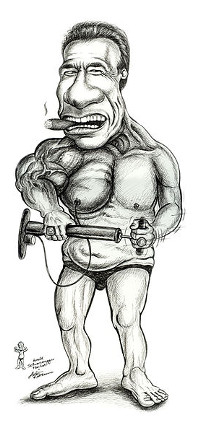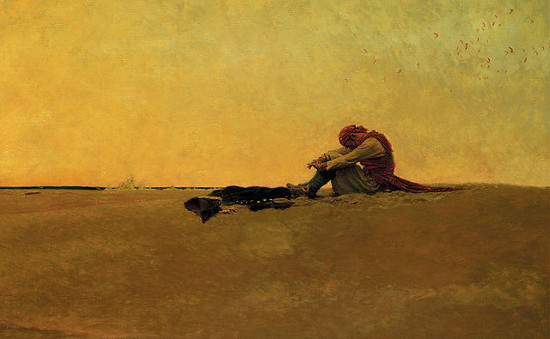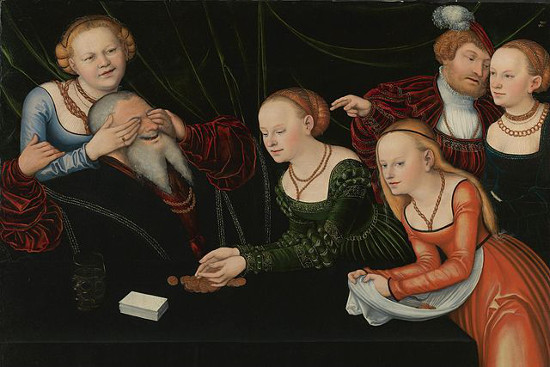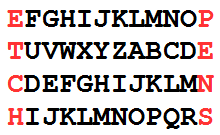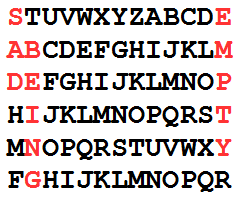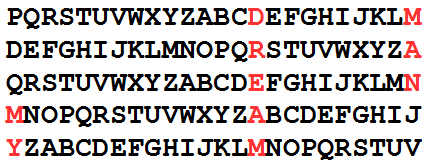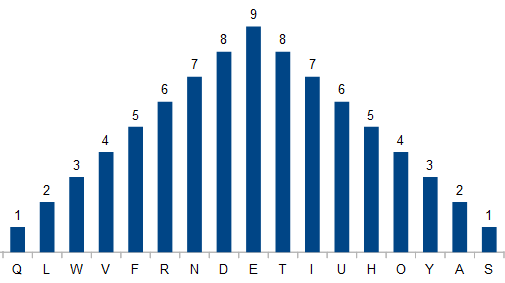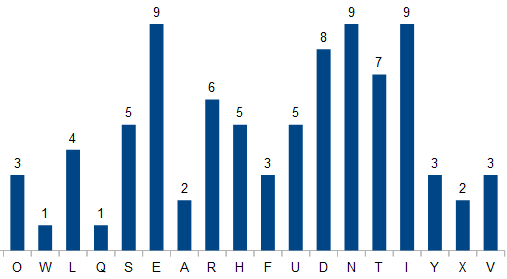LEG and RUN share the same “bit” pattern in Morse code:
·-·· · --·
·-· ··- -·
So do EARN and URN (which are also homophones):
· ·- ·-· -·
··- ·-· -·
(Discovered by Philip Cohen.)
UPDATE: Reader Dave Lawrence wrote a script to find more of these. He found 2,900, including these highlights:
[one_third]TEMPT YAK[/one_third][one_third]ATTIC JINN[/one_third][one_third]SUAVE SINNER[/one_third]
[one_third]KILL TRUSTEE[/one_third][one_third]NIACIN BANNER[/one_third][one_third]CONVEX COBALT[/one_third]
[one_third]DRAIN NINETEEN[/one_third][one_third]WOMEN JOKE[/one_third][one_third]OMELETS TODDLE[/one_third]
[one_third]ENZYME APRON[/one_third][one_third]GOAT MEOW[/one_third][one_third]EMINENT PAINT[/one_third]
[one_third]ABSINTHE PHIALS[/one_third][one_third]NIPPLE BANANAS[/one_third][one_third]LEFTIE LEFTS[/one_third]
[one_third]CONTENT COCK[/one_third][one_third]DOTTY TUMMY[/one_third][one_third]PAPER WINGER[/one_third]
[one_third]EERIEST VISIT[/one_third][one_third]GENUINE GAVEL[/one_third][one_third]WETTEST ANGST[/one_third]
[one_third]SPEED SATIRE[/one_third][one_third]REUNITE LEPER[/one_third][one_third]COW COAT[/one_third]
[one_third]CINDER CURVE[/one_third][one_third]FUNK ELEMENT[/one_third][one_third]THOSE BAGS[/one_third]
[one_third]DELIVER BLISTER[/one_third][one_third]CAUSES CRASH[/one_third][one_third]DEFENSIVE THRASHER[/one_third]
[one_third]SKIN STAIN[/one_third][one_third]CHIMNEY CHUTNEY[/one_third][one_third]SOME VOTE[/one_third]
[one_third]PESKIER WHALER[/one_third][one_third]RANDY REMEDY[/one_third][one_third]ESTEEMED SAUCE[/one_third]
[one_third]MANGO TYPO[/one_third][one_third]TEXTUAL CANARD[/one_third][one_third]INANE FEZ[/one_third]
[one_third]REEXAMINE ASTEROID[/one_third][one_third]DEFILE BIBLE[/one_third][one_third]MILKMEN MIRROR[/one_third]
[one_third]BEAT THAT[/one_third][one_third]NEAREST DENTIST[/one_third][one_third]GRANDER GREMLIN[/one_third]
[one_third]TIGER TUNER[/one_third][one_third]SUCH HANDS[/one_third][one_third]INDEXED URINAL[/one_third]
[one_third]TICKLED NECTARINE[/one_third][one_third]JACK ATTACK[/one_third][one_third]GREENISH GLASSES[/one_third]
[one_third]BEBOP DUSTMAN[/one_third][one_third]PATIENCE WIZARD[/one_third][one_third]DRAMA NINJA[/one_third]
[one_third]BAROQUE BAROMETER[/one_third][one_third]NEURON BARON[/one_third][one_third]NEUTRON BACON[/one_third]
[one_third]DISK THEFT[/one_third][one_third]PAMPAS PEOPLE[/one_third][one_third]TROIKA COURT[/one_third]
[one_third]COLLIE TROLLS[/one_third][one_third]MINISCULE MINISKIRTS[/one_third][one_third]MATTED GORE[/one_third]
[one_third]INSULIN INHALER[/one_third][one_third]MEETING GETUP[/one_third][one_third]SELF SERVE[/one_third]
[one_third]KITTEN CAKE[/one_third][one_third]TRUTH CUBE[/one_third][one_third]CHAP TENSING[/one_third]
[one_third]PELICAN ABDICATE[/one_third][one_third]KALE TARTS[/one_third][one_third]TROUSER COUSIN[/one_third]
[one_third]VAST STREET[/one_third][one_third]DISTORTED DIVORCE[/one_third][one_third]BRUNETTE DELEGATE[/one_third]
[one_third]F*CKED ELEMENTAL[/one_third][one_third]MAIZE GNATS[/one_third][one_third]SPOUSE SWATTERS[/one_third]
[one_third]FIRMS INVADE[/one_third][one_third]CHIEF KISSER[/one_third][one_third]SWITCH SPACES[/one_third]
[one_third]THREE NESTS[/one_third][one_third]INVERTING FIRETRAP[/one_third][one_third]MOUSE OTTERS[/one_third]
[one_third]ANALYZE PARROTS[/one_third][one_third]AIMLESS RETCHES[/one_third][one_third]RAWHIDE RAPISTS[/one_third]
[one_third]MINIMAL GLANCE[/one_third][one_third]PRIESTS PRESIDE[/one_third][one_third]INBRED INTESTINE[/one_third]
[one_third]GUFFAW MILDLY[/one_third][one_third]MIDDAY GRAVY[/one_third][one_third]WONDER AMOEBAE[/one_third]
[one_third]PALE AXLE[/one_third][one_third]WHISKEY EMISSARY[/one_third][one_third]CAGED CAMEL[/one_third]
[one_third]MINTIER GENDER[/one_third][one_third]QUEER MAIDEN[/one_third][one_third]ASTERISK AIRLIFT[/one_third]
[one_third]SACRED SEQUEL[/one_third][one_third]ESPIED SEABED[/one_third][one_third]MAIM GNAT[/one_third]
[one_third]TURNIP TURBAN[/one_third][one_third_last]NIGHTIE NIGHTS[one_third_last]

